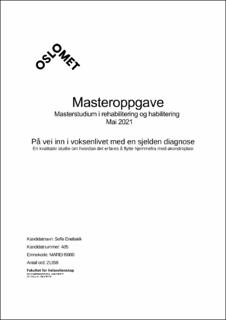På vei inn i voksenlivet med en sjelden diagnose : En kvalitativ studie om hvordan det erfares å flytte hjemmefra med akondroplasi
Master thesis
Published version
Permanent lenke
https://hdl.handle.net/11250/3123753Utgivelsesdato
2021-05Metadata
Vis full innførselSamlinger
Sammendrag
Formål: Formålet med denne studien er å få økt kunnskap om hvordan det erfares å flytte hjemmefra med diagnosen akondroplasi. Forskningsbasert kunnskap om de utfordringer og muligheter personer med akondroplasi erfarer med å flytte hjemmefra, kan bidra med viktig informasjon til andre med akondroplasi, samt fagpersoner og instanser som har ansvar for veiledning og oppfølging av brukergruppen. Kunnskapen kan også genereres og kan ha overføringsverdi til andre typer kortvoksthet og andre typer funksjonsnedsettelser.
Teoretisk forankring: Den teoretiske forankringen som er anvendt i oppgaven er et fenomenologisk hermeneutisk perspektiv. Dette perspektivet er anvendt for å få frem de unge voksne med akondroplasi sine subjektive erfaringer. Informantenes erfaringer er videre belyst ved hjelp av valgt teori.
Metode: Studien er kvalitativ og det er anvendt semistrukturerte intervjuer. Det empiriske materialet er innhentet fra fem unge voksne i alderen 20 til 30 år, med diagnosen akondroplasi. I analysen av det empiriske materialet ble det transkriberte materialet gjennomgått gjentatte ganger. Ord og utrykk ble markert og deretter samlet og identifisert til temaer som var felles for alle informantene. Temaene som kom frem i analysen ble fortolket med teori.
Resultat: De tre temaene som kom frem i analysen er usikkerhet, hverdagsliv og selvstendighet. Temaene er organisert i hvert sitt hovedavsnitt, med to eller tre underkategorier. Temaet usikkerhet omhandler informantenes erfaringer før de flyttet hjemmefra, mens temaet hverdagsliv omhandler hvordan dette erfartes i ettertid. Selvstendighet er et overordnet tema som omhandler informantenes refleksjoner i ettertid av flyttingen.
Konklusjon: Unge voksne med akondroplasi erfarer en rekke utfordringer og gleder med å flytte hjemmefra. Studien beskriver deres erfaringer. Flere kvalitative studier for eksempel knyttet til sosiale relasjoner, utdanning og arbeid vil videre være nyttig og kan bidra til å tilføre økt kunnskap i feltet. Dette kan videre gi mer grunnlag for økende forståelse for de unge voksnes livssituasjon.
Nøkkelord: Akondroplasi, hverdagsliv, voksenlivet, kortvoksthet, selvstendighet Purpose: The purpose of this study is to increase knowledge about how it is experienced for people with achondroplasia to move into their first independent home. Research-based knowledge about the challenges and opportunities that people with achondroplasia experience with moving away from their childhood home, can contribute to important information to others with achondroplasia. As well as professionals and agencies responsible for guidance and follow-up of the user group. The knowledge can also be generated and can transfer value to other types of short stature, and other types of disabilities.
Theory: The theoretical fundation in the thesis is a phenomenological hermeneutic perspective. This perspective is used to bring out the young adults with achondroplasia's subjective experiences. These are highlighted through using selected theory.
Method: This is a qualitative study, using semi-structured interviews. The empirical material was gathered from five young adults, aged 20 to 30 years old, with achondroplasia diagnosis. In the analysis of the empirical material, the transcribed material was reviewed repeatedly. Words and expressions were marked, and then collected and identified to topics that were common to all the informants. The themes that emerged in the analysis were interpreted with theory.
Results: The three themes are insecurity, everyday life and independence. Then it was organized in separate sections with two or three subcategories. The topic of insecurity is about the informants' experiences before they moved away from their childhood home. While the topic of everyday life was about how they experience after they moved out. Independence is an overarching theme that deals with the informant’s reflections in the aftermath of the move.
Conclusion: Young adults with achondroplasia experience several challenges and positivity changes when they move away from their childhood home. This study describes their experiences. More qualitative studies, for example related to social relations, education and work, it will also be useful and can contribute to increased knowledge in the field. This can also provide a bigger understanding of the young adult’s life situation.
Key Words: Achondroplasia, everyday life, adulthood, short stature, independence
